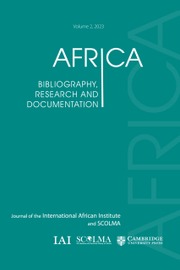In Sangoma, his account of numerous African expeditions, Gatti (Reference Gatti1962: 140) notes that two of those who smoothed the way for the making of Siliva were ‘Mr Lugg’, who sorted permissions and negotiated other local arrangements, and, as interpreter, ‘Dube, a reliable mission-educated native who spoke fluent English’. There is an intriguing backstory here.
Harry Lugg (1882–1978) was himself a fluent speaker of isiZulu. He had joined Natal’s Native Affairs Department in the late 1890s, first as court interpreter, then rising to magistrate. By the late 1920s, he was regarded as a ‘veteran’ of African affairs. (A few years later, he would be appointed Chief Native Commissioner.) He was also a scholar; in fact, in 1927, he published a paper on Zulu agricultural ceremonies in the respected journal, Bantu Studies. Of interest, he noted that these ceremonies, conducted to ensure good yields, were ‘tending to die out nowadays’ (Lugg Reference Lugg1927: 357).
The most likely candidate as the interpreter was the leading politician, educationalist, author and newspaper editor, John Langalibalele Dube (1872–1946). By now in his mid-fifties, he was well passed the zenith of his power. He and his wife, Nokutela Mdima, were well known for founding the newspaper Ilanga lase Natal in 1901 and the important educational centre Ohlange Institute in 1903. He had been elected President of the newly formed South African Native National Congress in 1912 and had soon after led a delegation to London to protest against the infamous Native Land Act of 1913.
By the 1920s, however, much of his energy was devoted to rescuing what he could of his considerable achievements, so that they would have some legacy. Nokutela had died under tragic circumstances in 1917; he was alienated from the National Congress movement and had recently suffered the indignity of being ousted even from a regional role; he was struggling to keep Ohlange under black leadership; and Ilanga was facing growing competition from edgier, urban-based newspapers pitching for a growing African readership.Footnote 1
Lugg knew Dube well and liked him – not only was he a distinguished, Western-educated leader but also a member of the inner circle of the amaQadi, the chiefdom into which his forebears had been born. Lugg probably recommended Dube to Gatti. Dube had recently (in April 1927) arrived home from no less than his sixth tour abroad to raise funds for and promote his most important cause, Ohlange, and had reason to be in Zululand. He wished to discuss a closer political alliance with Solomon kaDinuzulu, the Zulu king, between Western-educated Africans and ‘traditionalist’ leaders (Cope Reference Cope1993).
There were more pressing matters than Dube’s own career, however. The 1920s were a decade of intensifying segregationist legislation and white control in South Africa, and of land hunger in Zululand. After 1925, white farmers in neighbouring areas began evicting large numbers of African farm workers, who streamed into the Zululand reserves, which in turn led to a rise of so-called ‘faction fights’. Added to that, both 1926 and 1927 had been years of drought and poor harvest in the region. Although there was still a level of self-sufficiency in Zululand homestead production, these ‘faction fights’ were the result of a long and intense struggle to defend it, dating from before the Anglo-Zulu war of 1879; it was a struggle, moreover, that was ongoing. A new force had blown in just at the time Gatti and crew arrived to film. It was the Industrial and Commercial Workers’ Union, the first general workers’ union to be established in South Africa. Already by 1927 it had nearly 30,000 members in Durban and not far from Eshowe, union officials were claiming by June that year to have signed up over 10,000 new members (Bradford Reference Bradford1987: 196). Although Dube and Lugg were sympathetic to the plight of the landless, both had every reason to halt the rise of the ICU.
This world was thus not the unchanging one portrayed in Siliva. Yet it is perhaps precisely because they were so aware of the threats, as they saw them, to the way of life depicted in the film (as well as undoubtedly sympathetic to the novelty of an all-African cast) that Dube and Lugg had every desire to assist in the creation of Gatti’s and Ciprioni’s idealized version of ‘traditional Zulu life’. At that moment in time, it served the interests they represented on the local political scene very well.
Heather Hughes is Professor of Cultural Heritage Studies at the University of Lincoln, with interests in contested and neglected heritage, digital archives and Southern African history. She is the author of First President: a life of John Langalibalele, founding president of the ANC (Jacana, 2011).


